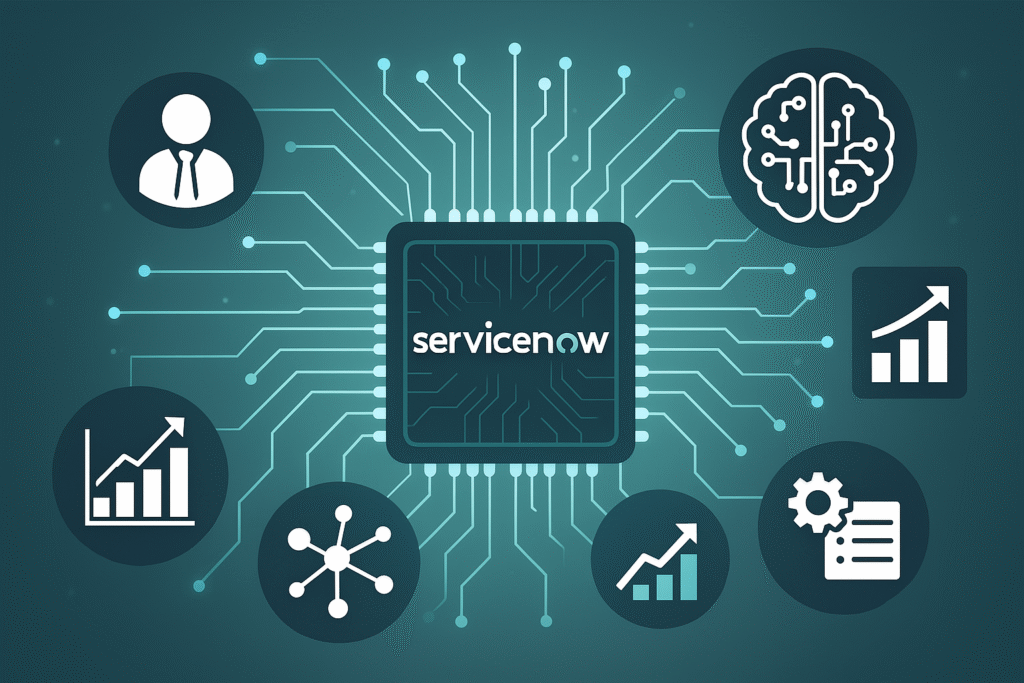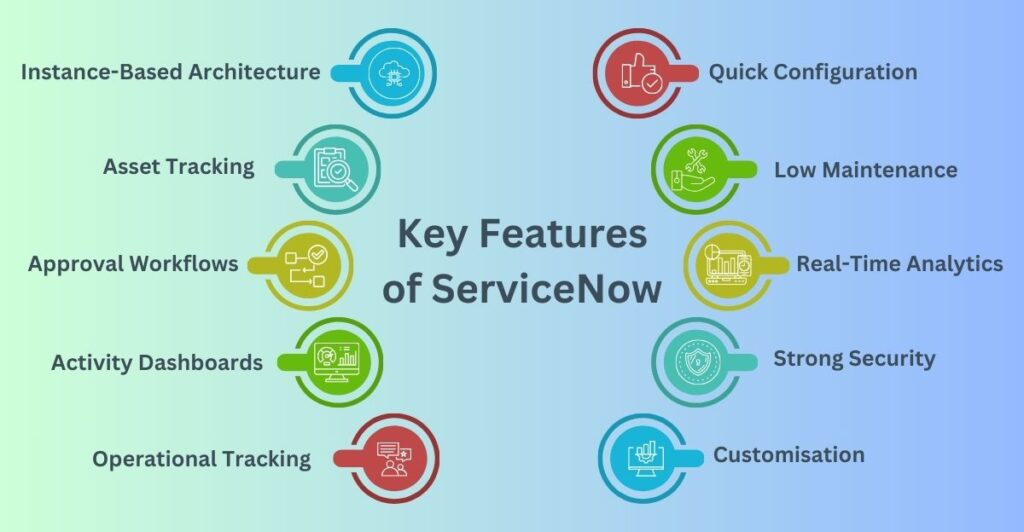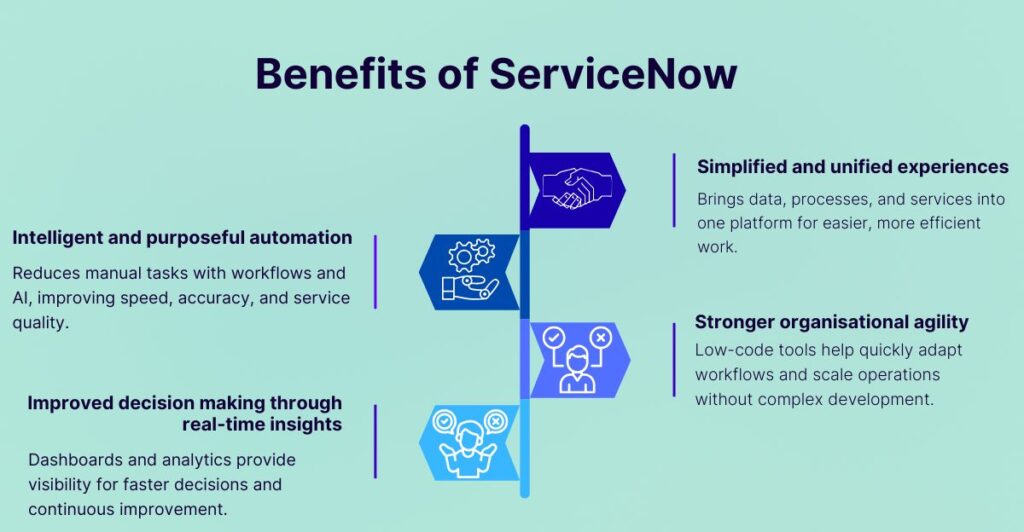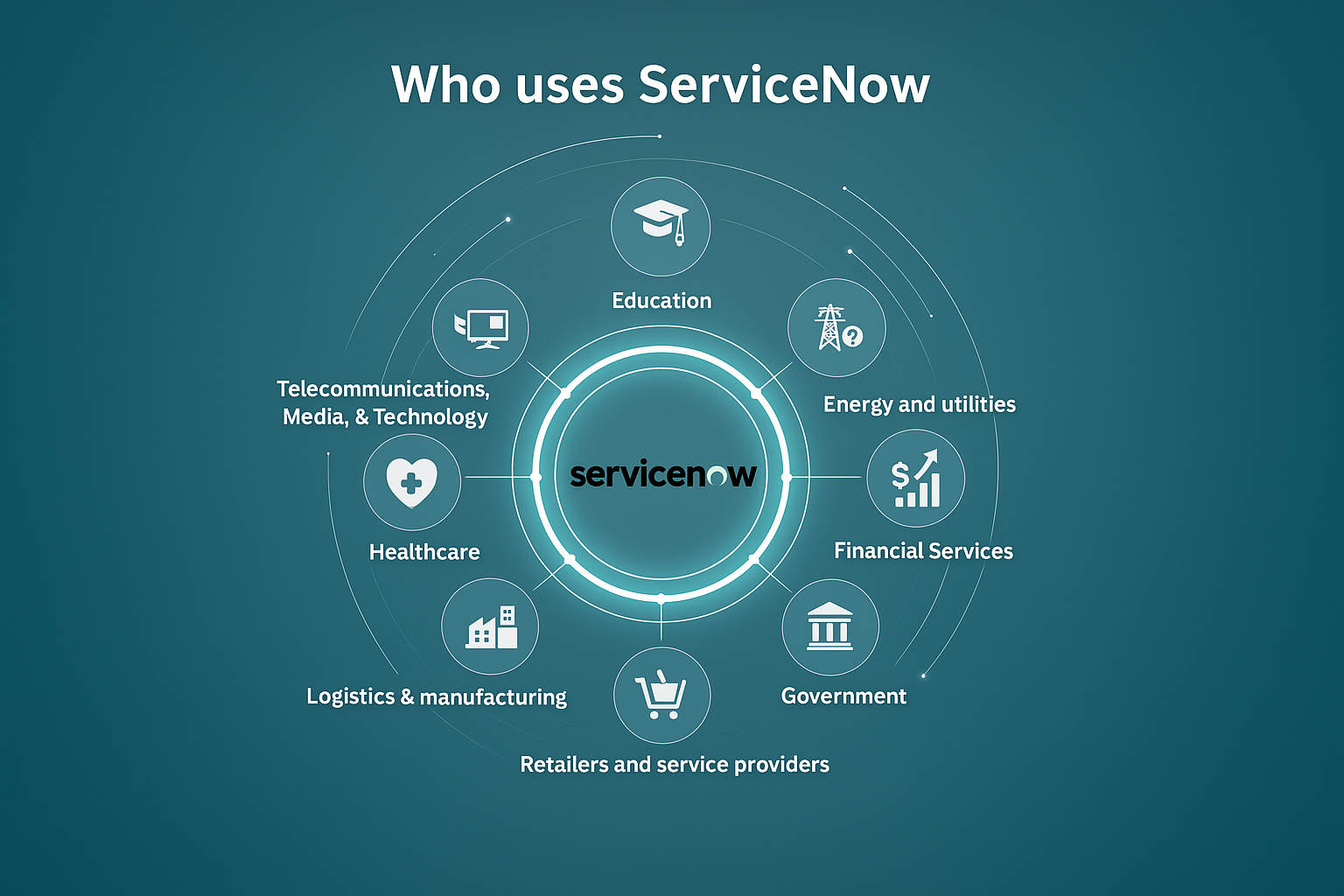What Is ServiceNow? The AI Platform for Modern Enterprises
Enhance ServiceNow efficiency with DevTools’ proven guidance. Unlock smoother operations, reliable integrations, and stronger outcomes. Connect with our team today to explore tailored optimization solutions.
14 +
Years of Experience
550 +
Happy Customers
250 +
Years of Tech Leadership Exp.

"License Reseller" and "Consulting & Implementation" Partner

TL;DR
- ServiceNow evolved from IT service management into an AI-powered platform that unifies data, processes, and workflows across the enterprise.
- Its AI Platform and low-code framework support automation, interoperability, and scalable digital transformation across industries.
- A broad suite of modules—spanning IT, operations, HR, customer service, security, and more—helps organizations improve efficiency and decision-making.
- DevTools enhances ServiceNow adoption through strategic consulting, custom solutions, implementation, innovation, and ongoing optimization.
For many business leaders, “ServiceNow” started as a synonym for IT ticketing. Today, it is the AI-powered nervous system for over 85% of the Fortune 500.
While its roots are in IT Service Management (ITSM), ServiceNow has evolved into a comprehensive platform that unifies data, processes, and people. The numbers speak to this transformation: in 2024 alone, the company reported $10.98 billion in revenue (up 23% year-over-year) and now serves a massive global customer base of over 8,100 enterprises.
It’s no longer just about fixing broken laptops. Organizations are utilizing the ServiceNow AI Platform to achieve significant efficiency gains, with some reporting reductions of up to 30% in operational costs through AI-driven automation. Whether streamlining HR onboarding, automating customer service, or managing complex security workflows, ServiceNow has become the “platform of platforms” for digital transformation.
This article delves into what ServiceNow is today, the tangible ROI of its AI capabilities, and why the world’s leading enterprises trust it to run their operations.
What is ServiceNow?
ServiceNow is an AI-powered, cloud-based platform that helps organisations automate and manage their workflows across IT, HR, customer service, security, and other departments. It runs on a single data model and provides tools to digitise tasks such as handling IT incidents, resolving customer queries, managing employee requests, and monitoring operations. With built-in AI, low-code capabilities, and seamless integrations, ServiceNow enables businesses to reduce manual work, eliminate silos, and deliver consistent, efficient digital experiences for employees and customers.
History of ServiceNow
ServiceNow was founded in 2004 by Fred Luddy. Luddy established a home office to develop a cloud-based system that would digitize operations through a user-friendly interface. The company grew quickly and went public in 2012. The company has expanded its product line through the years by delivering cloud-based AI-powered solutions to businesses across the world. ServiceNow continues to pursue its core objective of enabling people to achieve better results from their technological resources.
The ServiceNow AI Platform
The ServiceNow AI Platform operates as the core technological foundation that enables ServiceNow to function. The solution platform serves as the foundation for all solutions, which include IT operations and customer service and HR and finance, and industry-specific applications. The AI Platform operates with a unified low-code framework that enables data to move automatically between different systems and applications through its reusable data model. Organizations can digitize any process through pre‑built and customizable workflows, which help them maximize their existing IT investments to achieve growth.
Solution categories
ServiceNow organizes its capabilities into solution categories as follows:
- Technology Excellence: AI and machine learning, and automation systems provide secure technology services that enable enterprises to gain strategic workflow visibility and achieve fast and agile operations.
- AI-driven self-service technology enables customers to solve their issues independently, which results in lower case numbers and longer response times that lead to better customer retention.
- Operational Excellence: The organization reaches cost reduction and operational stability through its process systems, which operate with transparency and efficiency.
- Employee Experience: A personalized, secure platform unifies tools and information to enable employees who work flexibly and efficiently.
- Hyperautomation and Low Code: Low‑code and no‑code development tools accelerate app delivery and modernize legacy processes.
- Finance and Supply Chain Management: Automation reduces manual processes and streamlines supplier collaboration.
Key Features of ServiceNow

ServiceNow offers a comprehensive set of features that help organisations modernise and streamline their workflows:
- Instance-Based Architecture: Every organisation receives a dedicated and secure instance for customisation and performance.
- Asset Tracking: ServiceNow simplifies tracking of IT and non-IT assets throughout their lifecycle.
- Approval Workflows: Automated and controlled approval processes ensure compliance and reduce delays.
- Activity Dashboards: Real-time dashboards provide clear visibility into tasks, performance, and service operations.
- Operational Tracking: Teams can monitor work progress, service levels, and ongoing activities with improved accuracy.
- Quick Configuration: The platform requires minimal setup and offers ready-to-use components for faster adoption.
- Low Maintenance: As a cloud-based platform, ServiceNow ensures reliable performance with minimal upkeep.
- Real-Time Analytics: Organisations can analyse data instantly to make informed decisions.
- Strong Security: Built-in security controls ensure data confidentiality and integrity.
- Customisation: Low-code and configuration tools allow teams to tailor workflows to their unique needs.
Benefits of ServiceNow

ServiceNow offers clear and meaningful advantages for organisations that want to modernise their operations and deliver consistent digital experiences across departments.
Simplified and unified experiences: ServiceNow brings data, processes, and services together in a single platform. Users interact with an intuitive interface where information from multiple systems is presented clearly, helping teams learn, adapt, and work efficiently without replacing existing tools.
Intelligent and purposeful automation: With strong workflow automation and built-in AI capabilities, ServiceNow reduces manual work and improves service accuracy. Routine tasks, approvals, and issue resolutions become automated, allowing teams to focus on higher-value activities while improving service speed and quality.
Stronger organisational agility: ServiceNow’s low-code environment enables quick adjustments to workflows, applications, and processes. Organisations can respond faster to new requirements, maintain visibility and governance, and scale their operations without complex development work.
Improved decision making through real-time insights: Real-time dashboards and analytics provide visibility into service performance, operational trends, and user activity. This helps leaders act quickly, identify bottlenecks, and drive measurable improvements across departments.
Read this article to know more: Benefits of ServiceNow for Your Business Operations
Who uses ServiceNow?

One of ServiceNow’s strengths is versatility. As it supports integration with legacy and modern systems, it supports workflows across nearly every sector. Sectors using the platform include:
- Education: Digital workflows of ServiceNow help students and faculty have better experiences at universities and other institutions. These workflows cover everything from IT support and facilities management to HR services and course administration.
- Energy and Utilities: ServiceNow enables energy and utilities companies to make operations run more smoothly, maintain critical infrastructure, ensure compliance with regulations, and improve field services and asset management efficiency.
- Financial Services: Banks, insurance companies, and fintech companies modernize their operations, make sure customers have a smooth experience, follow the rules better, and manage risk better.
- Government: Public-sector agencies use ServiceNow to better serve citizens, be more open, update their IT systems, and make their operations more resilient.
- Healthcare: ServiceNow helps hospitals and healthcare networks improve patient experiences, simplify administrative tasks, optimize equipment and facility use, and support compliance with regulations.
- Logistics and Manufacturing: ServiceNow enables organizations to use automation to improve global supply chain management through better asset control, inventory management, employee performance enhancement, and cost reduction.
- Retail: ServiceNow helps retailers and service providers improve customer interactions, simplify back-office operations, and enhance workforce and supply chain efficiency.
- Telecommunications, Media, and Technology: ServiceNow allows organizations to manage complex network systems more effectively while enhancing service delivery speed, customer support, and driving technological advancement.
ServiceNow Products
ServiceNow provides its customers with a complete range of products that operate through its single unified AI platform. The products operate to automate business operations and IT systems, and customer management functions, which enable organizations to boost their operational efficiency and creative potential. The products function as connected systems that use a single data structure to enable complete enterprise-wide connectivity and analytical capabilities.
IT Service Management (ITSM)
ServiceNow bases its core functionality on ITSM, which enables IT departments to provide quicker and more dependable service delivery. The system performs automated incident, problem, and change management functions through AI-based predictive maintenance that speeds up problem-solving. ITSM converts standard IT operational work into service-based proactive functions.
IT Operations Management (ITOM)
ITOM delivers immediate monitoring capabilities that show the current status of infrastructure systems and applications. The system enables organizations to detect their assets while tracking system performance and running pre-defined automated incident response protocols. ITOM uses predictive AIOps and event correlation to reduce system downtime while maintaining the continuous operation of digital services.
IT Asset Management (ITAM)
ITAM enables organizations to monitor and enhance their management of hardware systems and software applications, and cloud-based infrastructure. The system minimizes waste while handling licenses and keeping the entire IT asset life cycle compliant. The system provides organizations with total management capabilities for their technology infrastructure through its integration with ITOM and CMDB.
Strategic Portfolio Management (SPM)
SPM (formerly Project Portfolio Management) enables organizations to maximize their investment returns for achieving their business objectives. The system allows leaders to create plans and set priorities while monitoring initiative progress through its active dashboard interface. With integrated demand and resource management, organizations can make data-driven decisions and maximize ROI.
Customer Service Management (CSM)
CSM enables ServiceNow to provide connected customer experiences that extend its capabilities beyond IT service management. The system links customer service departments to back-office operations, which enables teams to solve problems more efficiently. By integrating AI chatbots, self-service portals, and case workflows, CSM improves satisfaction and reduces operational costs.
HR Service Delivery (HRSD)
The system at HRSD automates human resources operations to create uniform experiences for all employees. The system performs automated onboarding operations and case management, and life-cycle event processing while enabling staff members to access a self-service platform for instant answers and request handling. The result is a more efficient and engaged workforce.
Security Operations (SecOps)
The combination of security operations with IT operational capabilities in SecOps enables organizations to detect threats quickly and respond effectively. The system performs automated workflow management between security applications and the ServiceNow platform to detect vulnerabilities that get fixed before they become major issues. The solution enables security personnel to access IT staff members for support.
Governance, Risk, and Compliance (GRC)
ServiceNow GRC offers organizations a single system to handle risk management and compliance, and audit requirements. The system operates automated control tests and policy management, and issue resolution functions which enable organizations to fulfill regulatory needs and enhance their governance systems.
Field Service Management (FSM)
Field Service Management optimizes field operations through its system, which uses intelligent task assignment and real-time inventory management, and technician performance tracking. Whether it’s telecom, utilities, or manufacturing, FSM ensures technicians have what they need to deliver great service in the field.
Now Assist and AI Agents
The system uses generative AI to create Now Assist and AI Agents, which handle conversations and information summarization, and module task execution. The system enables employees and customers to obtain immediate responses, which simultaneously boosts operational efficiency and decreases workload requirements.
Key Business Challenges Solved by ServiceNow
ServiceNow serves as a solution for enterprises to address various organizational problems:
- Legacy System Integration: The implementation of ServiceNow helps organizations solve multiple problems that arise from using multiple legacy systems.
- Process and Data Unification: The platform unifies all processes and data into one platform, which eliminates the requirement for system replacement.
- Automation and Efficiency: The combination of low-code tools and AI technology through hyperautomation technology cuts down the number of tasks that require human intervention.
- User Experience Enhancement: The system provides users with enhanced experiences through its simplified interface and customized paths for employees and customers, which leads to higher satisfaction levels and customer loyalty.
- Business Agility: The organization can make fast changes to market conditions because it has a unified data model and reusable components.
- Governance and Compliance: The AI Platform within ServiceNow provides built-in governance and security features that support organizations in fulfilling their industry-based regulatory standards.
How DevTools Enhances Your ServiceNow Journey
The ServiceNow platform enables DevTools to address actual business challenges because it provides a full range of functional capabilities.
Our approach includes:
- Strategic consulting: We evaluate your current processes and help determine which ServiceNow modules, such as ITSM, ITAM, ITOM, CSM, FSM, HRSD, SPM, etc., will yield the highest return. The platform development plan follows the direction of your company’s objectives.
- Custom solution design: Every organization is unique. DevTools architects create solutions that merge ServiceNow with existing systems and third-party software applications and data storage facilities. We incorporate AI features such as AI agents and predictive analytics to provide smarter and intelligent workflows.
- Implementation and configuration: Our certified consultants follow SAIF (ServiceNow Adaptive Implementation Framework, which is a scalable, repeatable, and value-driven way, and best practices to implement the platform. Our system provides a seamless deployment process for ITSM implementations as well as department-wide implementations.
- App development and innovation: DevTools helps in building custom apps on the ServiceNow platform using low‑code tools. This allows you to digitize niche processes without accumulating technical debt for automations or any other requirements.
- Managed services and continuous improvement: After go‑live, we offer support and optimization services. We help you adopt new ServiceNow innovations, like AI Control Tower or new agentic capabilities, as they become available.
Conclusion
ServiceNow has evolved from a ticketing system into an AI‑powered platform for enterprise transformation. Businesses can streamline operations, automate processes, and maintain agility with its low-code architecture, AI capabilities, and single data model. With solutions spanning technology excellence, customer experience, operations, employee experience, hyperautomation, and finance, ServiceNow supports virtually every industry. Fortune 500 companies that leverage ServiceNow use it to streamline operations and drive measurable outcomes.
Whether you’re exploring ServiceNow for the first time or looking to expand your footprint, partnering with DevTools ensures you get the most from this powerful platform. Our strategic consulting, customized implementations, and managed services help you harness ServiceNow as the AI platform for modern enterprise. Contact DevTools to start your journey with ServiceNow and AI.
FAQs
What is ServiceNow mainly used for?
ServiceNow offers solutions designed to optimize how companies utilize technology, unlocking productivity and delivering the best possible experiences for employees and customers. Supporting this mandate are categories of solutions made possible by ServiceNow: Technology Excellence, Customer Experience, Operational Excellence, Employee Experience, Hyperautomation and Low Code, and Finance and Supply Chain Management.
Is ServiceNow software or a tool?
ServiceNow is a fully functional PaaS platform that is used by more than 90% of the Fortune 500 companies.
Is ServiceNow an ERP?
It’s not another data repository or transactional system of record. With App Engine for ERP, ServiceNow can become the system of action and engagement your workforce interacts with using live ERP data.
What is Now Platform in ServiceNow?
The Now Platform enables users to transform manual workflows into automated processes that run on its cloud-based system for business process optimization and risk reduction. Organizations across various industries can accelerate their automation process through Intelligence, which merges AI and analytics directly into their applications.
What are the key modules of ServiceNow?
ServiceNow operates as a cloud-based platform that enables enterprises to manage their workflows through multiple operational modules. The essential modules consist of IT Service Management (ITSM) and IT Asset Management (ITAM and IT Operations Management (ITOM) and Customer Service Management (CSM) and HR Service Delivery (HRSD) and Security Operations (SecOps), and Governance Risk and Compliance (GRC).
Does ServiceNow use AI?
The ServiceNow AI Platform digitizes workflows across functions and critical business systems by connecting them on a single platform.
Which industries use ServiceNow?
The ServiceNow solutions are suitable for supporting most workflows across essentially every sector, including Education, Energy and utilities, Financial services, Government, Healthcare, Logistics, Manufacturing, Retail, Service providers, and Telecommunications, media, and technology.
How much does ServiceNow cost for businesses?
ServiceNow offers subscription-based plans that are customized to fit an organization’s size, modules, and workflow needs. Businesses are advised to consult ServiceNow or its authorized partners to determine the plan best suited for their requirements.

Pramodh Kumar M is a Solutions Architect at DevTools with over 6 years of specialized experience in DevSecOps and enterprise IT solutions. He holds multiple advanced certifications, including Certified Kubernetes Security Specialist (CKS), GitHub Advanced Security, and Azure Solutions Architect Expert. Pramodh specializes in Agile, Cloud & DevOps toolchain implementations, with extensive hands-on experience helping enterprises with digital transformation initiatives. His expertise extends to ServiceNow implementation and support. He is passionate about sharing practical insights on Cloud, DevOps, Automation, and modern IT operations.




